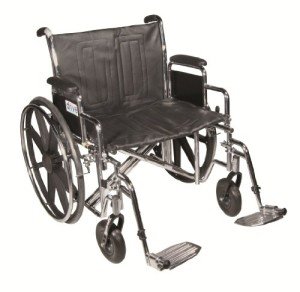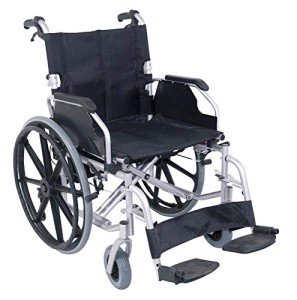 Benefits of a Bariatric Wheel Chair
Benefits of a Bariatric Wheel Chair
A bariatric wheelchair is developed to handle a higher weight capacity than standard wheelchairs, varying from 300-700 lbs. They are often classified as heavy duty power wheelchairs by Medicare and may require a prescription.
Features like a "no-lift" tilt and assisted back recline conserve caretakers from straining throughout rearranging. Seats with remarkable pressure redistribution, such as Broda's Comfort Tension Seating, reduce the danger of pressure ulcers.
Comfort
Whether in your home or at the health care center, comfort is just as essential for bariatric patients as it is for any other type of client. Specialized wheelchairs provide the capability to accomplish this in a variety of methods, including stronger frames and wider seats that make it simpler for bigger users to move and stay stable throughout movement.
A vast array of accessories is also readily available to optimize the comfort and functionality of a bariatric chair. From cushioned elevating footrests that are adjustable and can swing away, to desk-length arm rests that are easily moved, these accessories can offer the added support and stability required for comfy use.
Other vital functions to look for in a bariatric wheelchair include reclining capability, and support around the gluteal area to promote appropriate posture and reduce pressure injuries. Some chairs even feature a front-to-back tilt function to reduce the sit-to-stand transfer procedure and help lessen caregiver strain. Furthermore, wheelchair cushions can play an integral function in lowering pressure injuries and making sure user convenience. The AliMed bariatric wheelchair recliner Tri-Foam Cushion is specifically developed with a special layering system that supplies advanced pressure redistribution, preventing the buildup of heat and moisture and decreasing the danger of pressure ulcers.
Lastly, search for a bariatric chair with seating that is adjustable to fit the needs of each individual user. Some manufacturers, like Broda, design chairs with a variety of adjustments and features to help find the ideal fit. For instance, the Vanguard Bariatric Wheelchair provides a "no-lift" tilt and assisted back recline that are operated by a convenient foot pump to ease the user into position without straining the caretaker.
An essential piece of recommendations when purchasing a bariatric wheelchair is to get an extensive seating evaluation from a health care professional. This will supply a thorough view of the individual's sizing requirements, mobility goals, and activities of day-to-day living. It will likewise function as documents of medical necessity for insurance functions. Ultimately, this will guarantee that the chair fits appropriately and uses the ideal level of comfort and functionality.
Mobility
When you use a bariatric wheelchair, you can experience liberty and mobility without stressing over safety. These specialized chairs are wider and more durable than standard wheelchairs, and they can deal with a greater weight capacity. They also use pressure redistribution and repositioning functions to help avoid pressure sores. This makes them the finest choice for obese and obese users with a Body Mass Index (BMI) of 30 or greater.
Whether you require to check out household, buddies, or shop, a bariatric wheelchair can help you preserve your independence and lifestyle. In addition, you'll be able to interact socially with others in your community without the threat of being uneasy or risky.
These specialized wheelchairs are developed with enhanced elements, additional cushioning, and a larger seat and back to accommodate a higher weight capacity and range of user sizes and shapes. They can also be adapted to provide assistance around the gluteal area, which is particularly important for those with lung or cardiovascular conditions who might need a particular position to assist them breathe.
The Vanguard bariatric aids Wheelchair, for instance, is designed to permit users to maneuver easily throughout the home and social environment, while providing industry-leading safety functions. The chair's "no-lift" tilt and helped back recline are run with a foot pump to conserve caretakers from straining throughout repositioning and decrease the risk of injury. The chair's special Comfort Tension Seating system likewise adapts to accommodate the variety of bariatric physique and offers proper postural assistance, minimizing the threat of pressure injuries.
If you're interested in a bariatric wheelchair, talk with your physician or therapist about your needs. They can examine your medical status and physical condition, examine your living scenario, and make suggestions for the best chair to satisfy your specific needs. Sometimes, your physician might also recommend a rehab expert who can direct you through the process of picking the ideal chair for your specific way of life and abilities. They can likewise recommend you on moneying alternatives, consisting of whether your insurance strategy covers bariatric wheelchairs.
Self-reliance
Using a bariatric wheelchair that provides appropriate positioning and support enables users of as much as 750 pounds to remain more independent in activities of day-to-day living. Wheelchairs with specialty placing functions like no-lift tilt and helped back recline help in reducing caretaker pressure while offering a more comfortable seating experience for the user. Accessory alternatives like calf pads that accommodate bigger leg sizes and a range of armrest heights provide the choice to choose the very best suitable for a wide variety of clients. These specialized changes make it simpler for a client to do things like self-feeding, grooming, and getting in/out of the shower. These are the little things that can amount to a more fulfilling lifestyle for somebody with bariatric needs.
Sturdy reinforced frame, casters and weight bearing points guarantee toughness.
Safety
A bariatric wheelchair has a greater weight capacity than standard chairs, enabling it to comfortably support overweight individuals. Nevertheless, an individual's frame size, shape and structure likewise play a role in whether a bariatric mobility equipment chair is proper for them. For example, those with broad thighs might require a bariatric aids wheelchair that provides sufficient room to prevent pressure ulcers.
A crucial safety feature is the chair's load capacity, measured by its fixed and active load capabilities. Fixed load describes the quantity of weight that a chair can hold while sitting still, and active load is determined by performing a drop test on the wheelchair to simulate an individual plopping down into it.
The specialized frames of bariatric wheelchairs are reinforced to guarantee stability and security. In addition, lots of have adjustable parts that permit a customised fit. A well-fitting seat is vital for a comfortable ride, as shallow seats trigger a shift of weight forward that can increase instability. Deep seats can likewise push on knees, which triggers pelvic rotation that can result in a higher risk of falls. On the other hand, seats that are too wide can trigger skin shearing and turn the legs inward, putting stress on hips and joints.
Picking the best wheelchair for an obese client likewise requires considering their day-to-day activities, way of life and environments. For instance, those with long commutes may need a bariatric wheelchair with durable tires and casters that can handle rough terrains, in addition to a more steady seat with a higher weight capacity to accommodate heavy clothing and additional padding.
 Healthcare experts such as physiotherapists and occupational therapists can assist to identify which kind of wheelchair is best for their clients. Often, these specialists suggest bariatric wheelchairs with pressure redistribution and rearranging functions to help minimize the threat of pressure injuries. These features can make a considerable difference in enhancing a patient's comfort and overall quality of life.
Healthcare experts such as physiotherapists and occupational therapists can assist to identify which kind of wheelchair is best for their clients. Often, these specialists suggest bariatric wheelchairs with pressure redistribution and rearranging functions to help minimize the threat of pressure injuries. These features can make a considerable difference in enhancing a patient's comfort and overall quality of life.




